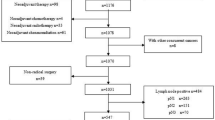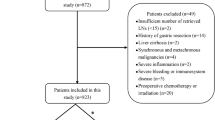Abstract
There is controversy about the prognostic significance of occult lymph node metastases detected by immunohistochemistry with the anti-cytokeratin antibody CAM 5.2. The aim of this study was to characterize occult lymph node metastases in colorectal carcinomas that might be associated with a higher risk of recurrence. Three hundred fifty-eight lymph nodes from 10 recurrent and 9 nonrecurrent cases of colorectal carcinoma were examined. All these patients had been reported originally as having no lympho node metastases by routine hematoxylin and eosin staining. Three 10-μm sections or ten 3-μm sections (30-μm total thickness) from each lymph node were stained with CAM 5.2 and examined for the presence of occult lymph node metastases. Occult metastases were detected in 67 of 175 lymph nodes from the recurrent cases, and in 23 of 183 lymph nodes from the nonrecurrent cases. The frequency of positive nodes was significantly higher in the recurrent cases. The recurrent cases had metastases in nodes more distant from the main tumor than did the nonrecurrent cases. Detection of occult lymph node metastases with cytokeratin immunohistochemistry may make it possible to identify patients with a higher risk of recurrence after the removal of a primary colorectal tumor.
Similar content being viewed by others
References
Dukes CE, Bussey HJR. The spread of rectal cancer and its effect on prognosis. Br J Cancer 1958;12:309–320.
Talbot IC, Ritchie S, Leighton MH, et al. The clinical significance of invasion of veins by rectal cancer. Br J Surg 1980;67:439–442.
Kune GA, Kune S, Field B, et al. Survival in patients with largebowel cancer. Dis Colon Rectum 1990;33:938–946.
Cutait R, Alves VAF, Lopes LC, et al. Restaging of colorectal cancer based on the identification of lymph node micrometastases through immunoperoxidase staining of CEA and cytokeratins. Dis Colon Rectum 1991;34:917–920.
Haboubi NY, Clark P, Kaftan SM, et al. The importance of combining xylene clearance and immunohistochemistry in the accurate staging of colorectal carcinoma. J R Soc Med 1992;85:386–388.
Jeffers MD, O'Dowd GM, Mulcahy H, et al. The prognostic significance of immunohistochemically detected lymph node micrometastases in colorectal carcinoma. J Pathol 1994;172:183–187.
Greenson JK, Isenhart CE, Rich R, et al. Identification of occult micrometastases in pericolic lymph nodes of Dukes' B colorectal cancer patients using monoclonal antibodies against cytokeratin and CC49. Cancer 1994;73:563–569.
Hayashi N, Arakawa H, Nagase H, et al. Genetic diagnosis identifies occult lymph node metastasis undetectable by the histopathological method. Cancer Res 1994;54:3853–3856.
Hayashi N, Ito I, Yanagisawa A, et al. Genetic diagnosis of lymph-node metastasis in colorectal cancer. Lancet 1995; 345:1257–1259.
Mori M, Mimori K, Inoue H, et al. Detection of cancer micrometastases in lymph nodes by reverse transcriptase-polymerase chain reaction. Cancer Res 1995;55:3417–3420.
Sedmak DD, Meineke TA, Knechtges DS. Detection of metastatic breast carcinoma with monoclonal antibodies to cytokeratins. Arch Pathol Lab Med 1989;113:786–789.
Galea MH, Athanassiou E, Bell J, et al. Occult regional lymph node metastases from breast carcinoma: Immunohistological detection with antibodies CAM 5.2 and NCRC-II. J Pathol 1991;165:221–227.
McGuckin MA, Cummings MC, Walsh MD, et al. Occult axillary node metastases in breast cancer: Their detection and prognostic significance. Br J Cancer 1996;73:88–95.
Nicholson AG, Marks CG, Cook MG. Effect on lymph node status of triple levelling and immunohistochemistry with CAM 5.2 on node negative colorectal carcinomas. Gut 1994;35:1447–1448.
Makin CA, Bobrow LG, Bodmer WF. Monoclonal antibody to cytokeratin for use in routine histopathology. J Clin Pathol 1984;37:975–983.
Japanese Research Society for Cancer of the Colon and Rectum. General rules for clinical and pathological studies on cancer of the colon, rectum and anus. 5th ed. (in Japanese). Tokyo: Kinbara, 1994;12–25.
Schildberg FW, Meyer G, Piltz S, et al. Surgical treatment of tumor metastases: General considerations and results. Surg Today 1995;25:1–10.
Author information
Authors and Affiliations
Rights and permissions
About this article
Cite this article
Sasaki, M., Watanabe, H., Jass, J.R. et al. Occult lymph node metastases detected by cytokeratin immunohistochemistry predict recurrence in “node-negative” colorectal cancer. J Gastroenterol 32, 758–764 (1997). https://doi.org/10.1007/BF02936951
Received:
Accepted:
Issue Date:
DOI: https://doi.org/10.1007/BF02936951




